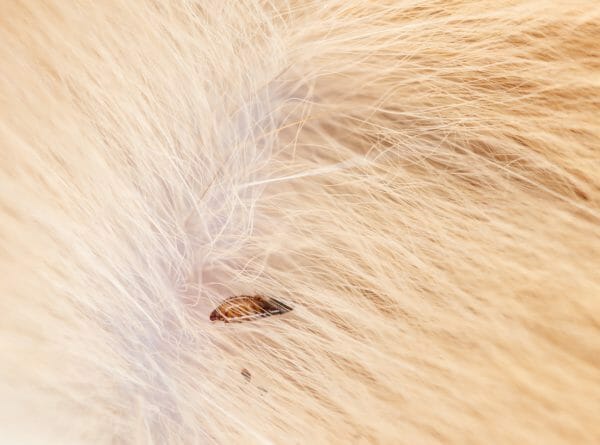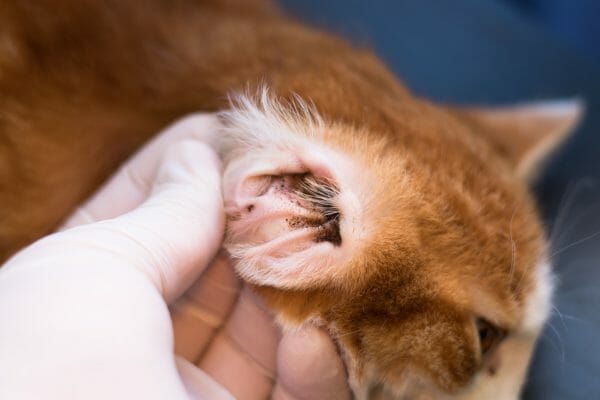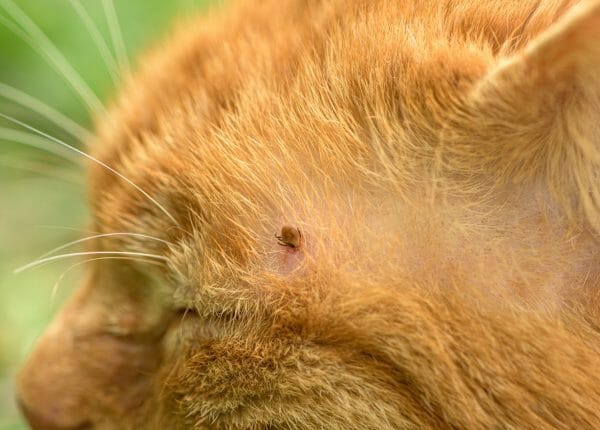Types of Parasites for Cats
Regardless of whether a cat remains indoors or is allowed to go out, all felines are susceptible to picking up internal or external parasites. A cat parasite can be debilitating and may put the animal at greater risk of catching viruses or infections. Understanding and recognizing the signs and life cycles of any potential parasite carried by cats is key to ensuring good health.
The most common types of external parasite cats carry include:
- Fleas
- Ticks
- Mites
The most common internal cat parasites are:
- Tapeworms
- Hookworms
- Roundworms
- Whipworms
- Protozoa
- Heartworms

What Are Fleas?
Fleas are small dark-colored insects that feed on the blood of their host. Once fed, fleas will rapidly breed, and an infestation can break out on a cat and around its home environment in a relatively short period of time. This cat skin parasite can spread infection while leaving the animal sore from scratching. Fleas can also carry other, smaller parasites. In addition, a flea infestation can lead to anemia.
What Are Ticks?
There are a wide variety of different ticks. However, many spread infections that can seriously affect a cat’s health, including causing anemia. Ticks can also carry parasites that infect a cat’s blood cells.
What Are Mites?
Mites often affect the cat’s ears causing pain and leading to bacterial infection. Mange mites live on a cat’s skin and can result in itchiness, bacterial infection, and hair loss.

What Are Tapeworms?
Tapeworms find their way into the cat via an intermediate host. This may include fleas, rodents, or birds. The most common type of tapeworm is dipylidium caninum. This parasite mainly affects kittens and can lead to digestive problems and stunt growth. Cats get this tapeworm from ingesting infected fleas.
A tapeworm called taenia is often found in infected adult cats that hunt and eat prey. Generally, this kind of tapeworm causes few problems. However, a heavy infection may block the cat’s intestines.
What Are Roundworms?
Parasitic worms in cats such as Toxocara Cati and Toxascaris Leonine can be passed between mother and kitten as larvae in milk. The eggs of these roundworms are passed in a cat’s feces. Another way for cats to develop roundworms is by catching infected prey such as mice, birds, shrews, and voles. Once the prey is consumed, the roundworm’s eggs will hatch in the cat’s stomach. Roundworms can bring on diarrhea, vomiting, and distended bowels.
What Are Whipworms?
Whipworm is a parasite that can infect a cat through contact with soil, contaminated water, or infested prey. The parasite is shaped like a small whip and can result in diarrhea, inflammatory bowel syndrome, bloody stools, and dehydration. A veterinarian will use a stool sample to assess for whipworm.
What Are Hookworms?
One of the most important intestinal parasites in cats is the hookworm. These parasites will latch onto the lining of the small intestine. Once in place, hookworms will suck blood causing anemia. The parasite can enter the cat through the mouth, the skin, or the feet. As this parasite burrows into the skin, secondary bacterial infections and eczema may become a problem.

What Are Protozoa?
Protozoa are organisms made up of a single cell that bring on diarrhea and bloody stools. There are two types of protozoa—coccidia and giardia. These are both microscopic protozoa that attach to the mucous membrane in the cat’s small intestine.
What Are Heartworms?
Heartworms are relatively uncommon. The parasite is spread through mosquito bites. When the mosquito feeds on the cat’s blood, it will inject the larvae of the heartworm into the bloodstream. As the larvae reach maturity, the parasite will travel to the heart and lungs.
Symptoms of heartworm infections are rapid breathing, coughing, vomiting, and weight loss. Sudden death can also occasionally occur. Heartworms can grow to be several inches in length. Fortunately, there is preventive medication that can be given monthly to prevent heartworm infestations.
How Can Cats Get Parasites?
Cats can attract parasites in a variety of ways, such as:
- Eating infected prey such as mice or birds
- Through contact with feces
- By being bitten by a flea, tick, or mosquito
- Through the mother’s milk while still a kitten

Cat Parasite Symptoms
The specific symptoms of parasites will vary. However, as parasitic larvae move through the cat’s body to the eye, lungs, stomach, and intestines, it can lead to some discomfort and inflammation. Signs of parasites in cats may include:
- Stomach pain and gastritis
- Vomiting
- Loss of appetite
- Problems breathing
- Distended abdomen
Cat Parasite Treatment
Whenever the signs of parasites are detected in a cat, action must be taken immediately. Knowing how to get rid of parasites in cats will minimize the severity of any infection. Home remedies for cat parasites include the use of the following:
- Garlic
- Pumpkin seeds
- Turmeric
- Apple cider vinegar
- Carrots
Although natural remedies for parasites in cats may help to an extent, they are no comparison to cat parasite medicine prescribed by a veterinarian. Some effective solutions are:
- Dewormers. These medications may be administered orally or by injection. Dewormers will kill larval and adult worms in the cat’s intestine.
- Panacur and Drontal Plus. These prescription medications are broad-spectrum and are useful when treating roundworm, hookworm, whipworm, and tapeworm.
- Praziquantel. This is a one-time injection that treats tapeworm infections. The medicine paralyzes and dislodges the worm’s sucker from the wall of the intestine. Once dislodged, the worm will pass in the cat’s feces.
Using monthly oral or topical flea and tick prevention will also reduce the chances of cats developing flea and tapeworm infections. The use of monthly heartworm medication is also suggested.

Parasite Prevention for Cats
To prevent parasites, cats should receive deworming and flea and tick treatments. Cats that go outdoors will encounter more opportunities to contract parasites, and a veterinarian may make specific recommendations to suit the cat’s lifestyle.
A veterinarian should regularly examine felines to identify signs of heartworm, along with an annual examination for other parasites. Heartworm prevention medication should also be used.
Cat owners should ensure that clean, potable water is always provided for the cat, and that litter boxes are frequently emptied and cleaned.
Can Cat Parasites Infect Humans?
Many parasites found in cat feces can infect humans, such as roundworms, giardia, and hookworms. Toxoplasmosis is an infection brought on by a cat feces parasite called toxoplasma gondii. This infection can be particularly troublesome for pregnant mothers and people with weakened immune systems.




